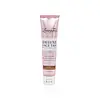What's inside
What's inside
 Key Ingredients
Key Ingredients

 Benefits
Benefits

 Concerns
Concerns

 Ingredients Side-by-side
Ingredients Side-by-side

Water
Skin ConditioningIsopropyl Myristate
EmollientDihydroxyacetone
Skin ConditioningCetearyl Alcohol
EmollientGlyceryl Stearate
EmollientCetearyl Glucoside
EmulsifyingPropanediol
SolventCeteareth-20
CleansingAloe Barbadensis Leaf Extract
EmollientCamellia Sinensis Leaf Extract
AntimicrobialPunica Granatum Fruit Extract
AntioxidantEuterpe Oleracea Fruit Extract
Tocopheryl Acetate
AntioxidantGlycerin
HumectantPentaerythrityl Tetra-Di-T-Butyl Hydroxyhydrocinnamate
AntioxidantHydroxyethyl Acrylate/Sodium Acryloyldimethyl Taurate Copolymer
Emulsion StabilisingSodium Metabisulfite
AntioxidantParfum
MaskingPhenoxyethanol
PreservativeEthylhexylglycerin
Skin ConditioningCoumarin
PerfumingBenzyl Benzoate
AntimicrobialLimonene
PerfumingHc Yellow No. 18
Cosmetic ColorantWater, Isopropyl Myristate, Dihydroxyacetone, Cetearyl Alcohol, Glyceryl Stearate, Cetearyl Glucoside, Propanediol, Ceteareth-20, Aloe Barbadensis Leaf Extract, Camellia Sinensis Leaf Extract, Punica Granatum Fruit Extract, Euterpe Oleracea Fruit Extract, Tocopheryl Acetate, Glycerin, Pentaerythrityl Tetra-Di-T-Butyl Hydroxyhydrocinnamate, Hydroxyethyl Acrylate/Sodium Acryloyldimethyl Taurate Copolymer, Sodium Metabisulfite, Parfum, Phenoxyethanol, Ethylhexylglycerin, Coumarin, Benzyl Benzoate, Limonene, Hc Yellow No. 18
Water
Skin ConditioningDihydroxyacetone
Skin ConditioningDecyl Glucoside
CleansingErythrulose
TanningGlycerin
HumectantAlthaea Officinalis Root Extract
Skin ConditioningTilia Cordata Leaf Extract
HumectantCamellia Sinensis Extract
AntioxidantChamomilla Recutita Extract
Skin ConditioningCalendula Officinalis Flower Extract
MaskingCucumis Sativus Fruit Extract
EmollientDehydroacetic Acid
PreservativeBenzyl Alcohol
PerfumingAloe Barbadensis Leaf Extract
EmollientAcacia Senegal Gum
MaskingAroma
Citric Acid
BufferingWater, Dihydroxyacetone, Decyl Glucoside, Erythrulose, Glycerin, Althaea Officinalis Root Extract, Tilia Cordata Leaf Extract, Camellia Sinensis Extract, Chamomilla Recutita Extract, Calendula Officinalis Flower Extract, Cucumis Sativus Fruit Extract, Dehydroacetic Acid, Benzyl Alcohol, Aloe Barbadensis Leaf Extract, Acacia Senegal Gum, Aroma, Citric Acid
 Reviews
Reviews

Ingredients Explained
These ingredients are found in both products.
Ingredients higher up in an ingredient list are typically present in a larger amount.
Aloe Barbadensis Leaf Extract is an extract of the leaves of the aloe, Aloe barbadensis, Liliaceae.
Aloe is one of the most well-known natural soothing ingredients, and for good reason. It’s full of water and has a cooling, calming effect on the skin, especially when it’s sunburned, itchy, or irritated. Aloe also helps your skin stay hydrated and smooth by mimicking what healthy skin naturally produces. On top of that, it contains vitamins and nutrients that support skin recovery.
It doesn’t protect you from the sun, but it can help your skin bounce back after too much time in it.
Let’s get into the details:
Aloe contains antioxidant Vitamins A, C, and E, which help fight off free radicals (unstable molecules from things like pollution that can damage your skin).
It’s also rich in polysaccharides, which are natural sugars that help hydrate the skin by acting like the skin’s own moisturizing agents. These, along with other sugars like monosaccharides, help form a protective barrier that locks in moisture.
Aloe works as both a humectant and an emollient. That means it draws water into the skin (humectant) and helps trap it there (emollient), making it an effective natural moisturizer.
You’ll also find a mix of other skin-supporting ingredients in aloe, including folic acid, choline, calcium, amino acids, fatty acids, and even Vitamin B12.
Out of the 420+ species of aloe, Aloe barbadensis is the most widely used in skincare products thanks to its gentle yet effective properties.
There are over 420 species of aloe but Aloe Barbadensis is the most commonly used for topical products.
Learn more about Aloe Barbadensis Leaf ExtractDihydroxyacetone, or DHA, is a simple sugar. It is frequently used in self-tanning products.
DHA binds to the amino acids in your dead skin cells to create a brown/orange color. Darkening begins to kick in a few hours after application and will continue to develop for up to 3 days. This ingredient can be drying.
Both the US and the EU have approved DHA in self-tanning products. In the EU, DHA is allowed at a maximum concentration of 10%. Most tanning products usually contain amounts between 3-5%.
If you are pregnant or have underlying medical conditions, it is best to speak with a dermatologist about using self-tanning products.
Learn more about DihydroxyacetoneGlycerin is already naturally found in your skin. It helps moisturize and protect your skin.
A study from 2016 found glycerin to be more effective as a humectant than AHAs and hyaluronic acid.
As a humectant, it helps the skin stay hydrated by pulling moisture to your skin. The low molecular weight of glycerin allows it to pull moisture into the deeper layers of your skin.
Hydrated skin improves your skin barrier; Your skin barrier helps protect against irritants and bacteria.
Glycerin has also been found to have antimicrobial and antiviral properties. Due to these properties, glycerin is often used in wound and burn treatments.
In cosmetics, glycerin is usually derived from plants such as soybean or palm. However, it can also be sourced from animals, such as tallow or animal fat.
This ingredient is organic, colorless, odorless, and non-toxic.
Glycerin is the name for this ingredient in American English. British English uses Glycerol/Glycerine.
Learn more about GlycerinWater. It's the most common cosmetic ingredient of all. You'll usually see it at the top of ingredient lists, meaning that it makes up the largest part of the product.
So why is it so popular? Water most often acts as a solvent - this means that it helps dissolve other ingredients into the formulation.
You'll also recognize water as that liquid we all need to stay alive. If you see this, drink a glass of water. Stay hydrated!
Learn more about Water